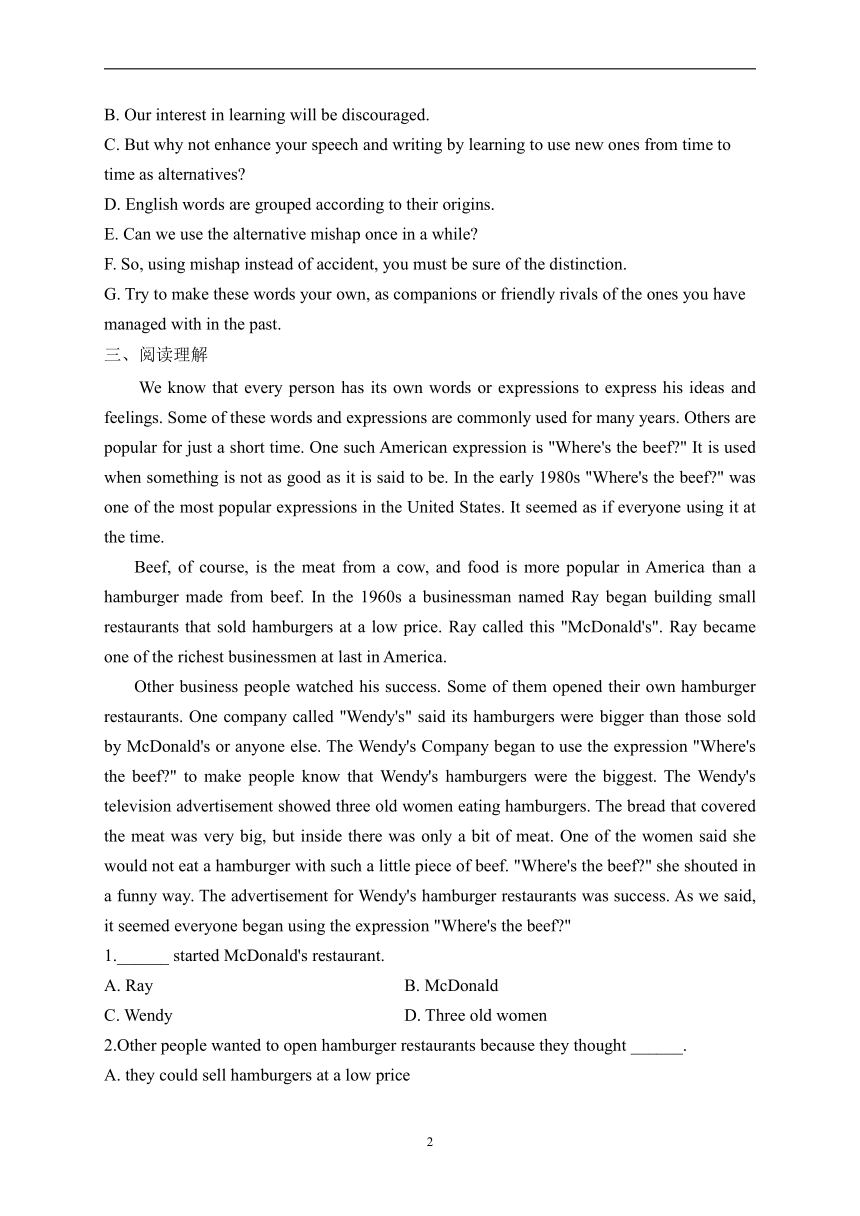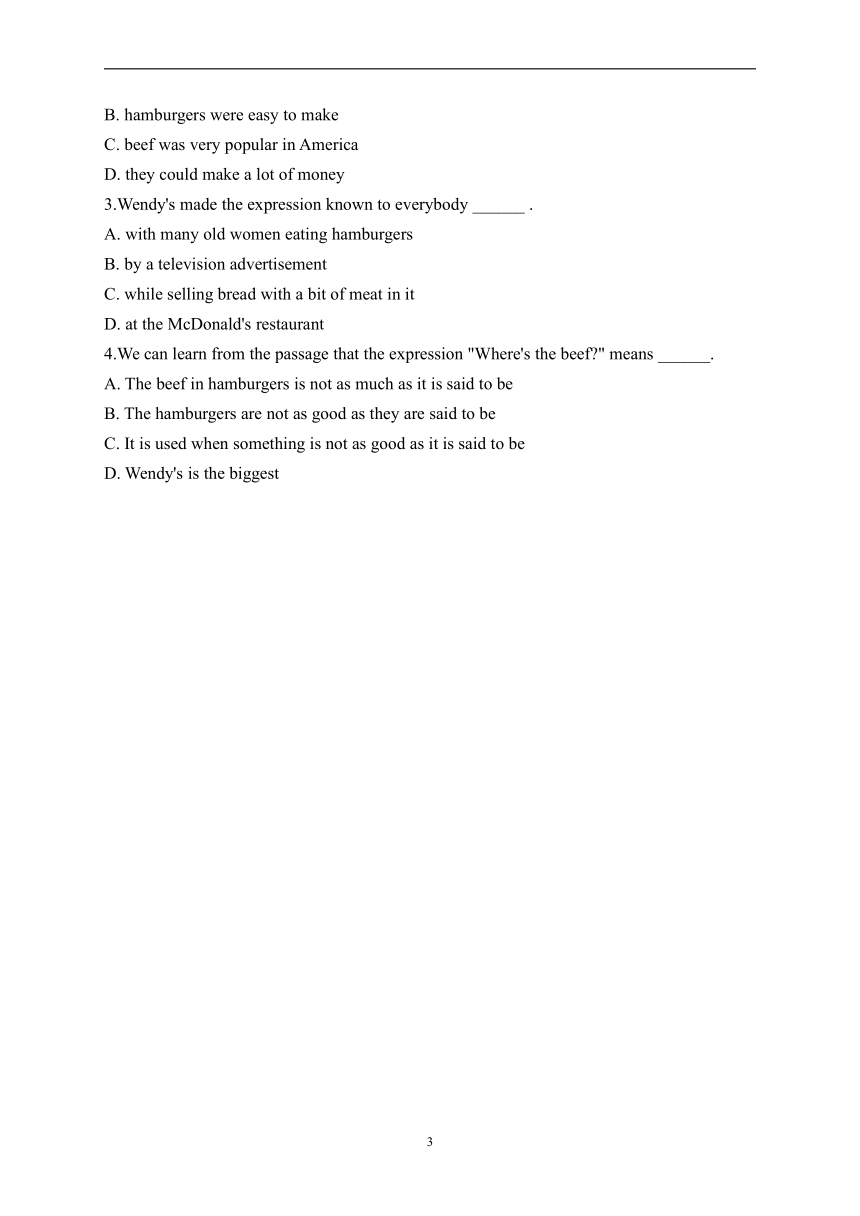北师版(2019)选择性必修第三册Unit 8 Literature Topic Tal课时练习(有答案)
文档属性
| 名称 | 北师版(2019)选择性必修第三册Unit 8 Literature Topic Tal课时练习(有答案) |

|
|
| 格式 | docx | ||
| 文件大小 | 25.7KB | ||
| 资源类型 | 教案 | ||
| 版本资源 | 北师大版(2019) | ||
| 科目 | 英语 | ||
| 更新时间 | 2023-03-30 21:14:24 | ||
图片预览



文档简介
Unit 8 Literature Topic Talk
一、填空
1.It's the second time that John __________(hold) an art exhibition.
2.It was the first time that he __________(visit) my hometown.
3.This is the second time that Jason and his parents _________(come) to China.
4.The exhibition tells the ____________(absorb) story of the steam age.
5.He is not the kind of child who is likely to be cowed into _____________(submit).
6.I hadn't figured ____________ getting home so late.
7.I submit _____________ the house is unfit for you to live in.
8.Submit a topic proposal _____________ your history teacher.
9.The surrounding villages have been absorbed ____________ the growing city.
10.We figured ____________ plane tickets and hotel bills, but forgot to add the cost of meals.
二、七选五
Variety is the spice of language. The words listed in this book are not intended to replace those that most people use most of the time. Rather, they are variations of the theme. We tend to use the same old words over and over again, to limit our power of expression by limiting our vocabulary. There is nothing wrong with the "old words". ①______
How often have you spoken of having an accident ②_______ Everyone talks of the usual thing to do or expect. Might not one, to enrich his speech, speak of the customary thing or why not occasionally describe a situation as aggravated instead of worsened
③______ Vary them with the "new words". English is an especially rich language, and often there are tiny differences between two words that are generally regarded as the same. Thus, a mishap(小事故) is not merely an accident; it is an unfortunate accident. (There can be fortunate accidents, like bumping into an old friend you haven't seen for years and whose address you've lost.) ④_______ Other examples: fragrant, for smelling good, or having a nice smell; morsel, for bit; deft, for skillful or clever.
No doubt a good many words in the list will be familiar to you, but do you use them, or do they remain the "property" of others They are included to introduce the variety, into your speech and writing. ⑤ _______ Let them compete, and make your language all the richer.
A. Don't throw away the "old words".
B. Our interest in learning will be discouraged.
C. But why not enhance your speech and writing by learning to use new ones from time to time as alternatives
D. English words are grouped according to their origins.
E. Can we use the alternative mishap once in a while
F. So, using mishap instead of accident, you must be sure of the distinction.
G. Try to make these words your own, as companions or friendly rivals of the ones you have managed with in the past.
三、阅读理解
We know that every person has its own words or expressions to express his ideas and feelings. Some of these words and expressions are commonly used for many years. Others are popular for just a short time. One such American expression is "Where's the beef " It is used when something is not as good as it is said to be. In the early 1980s "Where's the beef " was one of the most popular expressions in the United States. It seemed as if everyone using it at the time.
Beef, of course, is the meat from a cow, and food is more popular in America than a hamburger made from beef. In the 1960s a businessman named Ray began building small restaurants that sold hamburgers at a low price. Ray called this "McDonald's". Ray became one of the richest businessmen at last in America.
Other business people watched his success. Some of them opened their own hamburger restaurants. One company called "Wendy's" said its hamburgers were bigger than those sold by McDonald's or anyone else. The Wendy's Company began to use the expression "Where's the beef " to make people know that Wendy's hamburgers were the biggest. The Wendy's television advertisement showed three old women eating hamburgers. The bread that covered the meat was very big, but inside there was only a bit of meat. One of the women said she would not eat a hamburger with such a little piece of beef. "Where's the beef " she shouted in a funny way. The advertisement for Wendy's hamburger restaurants was success. As we said, it seemed everyone began using the expression "Where's the beef "
1.______ started McDonald's restaurant.
A. Ray B. McDonald
C. Wendy D. Three old women
2.Other people wanted to open hamburger restaurants because they thought ______.
A. they could sell hamburgers at a low price
B. hamburgers were easy to make
C. beef was very popular in America
D. they could make a lot of money
3.Wendy's made the expression known to everybody ______ .
A. with many old women eating hamburgers
B. by a television advertisement
C. while selling bread with a bit of meat in it
D. at the McDonald's restaurant
4.We can learn from the passage that the expression "Where's the beef " means ______.
A. The beef in hamburgers is not as much as it is said to be
B. The hamburgers are not as good as they are said to be
C. It is used when something is not as good as it is said to be
D. Wendy's is the biggest
答案以及解析
一、填空
1.答案:has held
2.答案:had visited
3.答案:have come
4.答案:absorbing
5.答案:submission
6.答案:on
7.答案:that
8.答案:to
9.答案:by
10.答案:in
二、七选五
11.答案:①-⑤ CEAFG
解析:这是一篇说明文。主要讲述了变化和多样性是语言的调味剂,我们可以试着用一些新词去替换一些旧词来进行描述,从而丰富我们的语言。
①上文"Variety is the spice of language. The words listed in this book are not intended to replace those that most people use most of the time. Rather, they are variations of the theme. We tend to use the same old words over and over again, to limit our power of expression by limiting our vocabulary. There is nothing wrong with the "old words".(多样性是语言的调味品。这本书中列出的词汇并不是要取代大多数人大部分时间使用的词汇。相反,它们是主题的变体。我们倾向于一遍又一遍地使用同样的老词,通过限制词汇量来限制我们的表达能力。"老词"没什么错)"可知上文强调多样性是语言的调味品,突出新词的地位。设空处位于段尾,应是对上文进行总结。C项"But why not enhance your speech and writing by learning to use new ones from time to time as alternatives (但是为什么不通过不时学习使用新的词来提高你的演讲和写作能力呢?)"与"There is nothing wrong with the "old words"."构成转折关系,与上文一致。故选C。
②上文"How often have you spoken of having an accident (你多久提起一次意外?)",讲到你多久提起一次意外,下文"Everyone talks of the usual thing to do or expect. Might not one, to enrich his speech, speak of the customary thing or why not occasionally describe a situation as aggravated instead of worsened (每个人都在谈论平常要做的事或期望的事。为了丰富他的演讲内容,谈论一些习惯性的事情,那为什么不偶尔把情况描述成"aggravated"而不"worsened"呢?)"可知,此处阐述用另外的表达描述上文的"having an accident"。设空处位于段中,承上启下,E项"Can we use the alternative mishap once in a while (为什么不偶尔使用替代性的"mishap"来描述呢?)"与上文及下文一致。故选E。
③下文"Vary them with the "new words". English is an especially rich language, and often there are tiny differences between two words that are generally regarded as the same. Thus, a mishap (小事故) is not merely an accident; it is an unfortunate accident. (There can be fortunate accidents, like bumping into an old friend you haven't seen for years and whose address you've lost.)(用"新词"改变它们。英语是一种特别丰富的语言,通常两个词之间有细微的差别,但通常被认为是相同的。因此,一次小事故不仅仅是一次事故,而是一次不幸的事故。可能也会有幸运的事故,比如撞见一个多年未见的老朋友,而且他的地址你也弄丢了)"可知,英语是一种特别丰富的语言,通常两个词之间有细微的差别,要用"新词"来改变"旧词",而不是扔掉它们。设空处位于段首,应是总领下文。A项"Don't throw away the "old words".(不要扔掉旧词)" 与下文一致。故选A。
④上文"English is an especially rich language, and often there are tiny differences between two words that are generally regarded as the same. Thus, a mishap(小事故) is not merely an accident; it is an unfortunate accident.(英语是一种特别丰富的语言,通常两个词之间有细微的差别,但通常被认为是相同的。因此,一次小事故不仅仅是一次事故,而是一次不幸的事故)",以及下文"Other examples: fragrant, for smelling good, or having a nice smell; morsel, for bit; deft, for skillful or clever.(其他例子: 芳香的,好闻,或者有好闻的气味;(这些意思差不多但是有区别);少量的,有点;灵巧的,有技巧或者聪明)"可知,设空处应是与上文是因果关系,下文是对上文设空处的另一个例子,两者的主题内容应是一致的。F项"So, using mishap instead of accident, you must be sure of the distinction.(所以,用mishap代替accident,你必须明白其中的区别)"与上文及下文一致。故选F。
⑤上文"No doubt a good many words in the list will be familiar to you, but do you use them, or do they remain the "property" of others They are included to introduce the variety, into your speech and writing.(毫无疑问,名单上的很多单词你都很熟悉,但是你是否使用它们,还是它们仍然是别人的"财产" ?它们包括在你的演讲和写作中,引入多样性)"讲到要运用这些新词,丰富你的写作和演讲。设空处位于段中,应是承接上文所讲。G项"Try to make these words your own, as companions or friendly rivals of the ones you have managed with in the past.(试着把这些词变成你自己的,成为你过去的伙伴的对手)"与上文一致。故选G。
三、阅读理解
1.答案:A
解析:细节理解题。根据第二段中"In the 1960s a businessman named Ray began building small restaurants that sold hamburgers at a low price. Ray called this "McDonald's".( 20世纪60年代,一个名叫Ray的商人开始建造小餐馆,以低价出售汉堡包。Ray把餐厅叫做"麦当劳"。)"可知,Ray创立了麦当劳。故选A。
2.答案:D
解析:细节理解题。根据第三段中"Other business people watched his success. Some of them opened their own hamburger restaurants.(其他商界人士目睹了他的成功。他们中的一些人开了自己的汉堡店)"可知,其他的商人目睹了Ray的成功后也想开店赚钱。故选D。
3.答案:B
解析:细节理解题。根据第三段中"The Wendy's Company began to use the expression "Where's the beef " to make people know that Wendy's hamburgers were the biggest. The Wendy's television advertisement showed three old women eating hamburgers. ( Wendy's公司开始使用"牛肉在哪里?"让人们知道Wendy's汉堡是最大的汉堡。Wendy's电视广告是三个老妇人在吃汉堡包)"以及后文"The advertisement for Wendy's hamburger restaurants was success. As we said, it seemed everyone began using the expression "Where's the beef ".( Wendy's汉堡店的广告很成功。正如我们所说,似乎每个人都开始使用"牛肉在哪里?"这个表达)"可知,Wendy's通过电视广告让每个人都知道了这个表达。故选B。
4.答案:C
解析:细节理解题。根据第一段中"One such American expression is "Where's the beef " It is used when something is not as good as it is said to be.(其中一个美式表达是"Where's the beef (牛肉在哪里 )"。这个短语指某事并不像它所说的那么好)"可知,"Where's the beef "被用来表达一件东西没有像说的那么好。故选C。
2
一、填空
1.It's the second time that John __________(hold) an art exhibition.
2.It was the first time that he __________(visit) my hometown.
3.This is the second time that Jason and his parents _________(come) to China.
4.The exhibition tells the ____________(absorb) story of the steam age.
5.He is not the kind of child who is likely to be cowed into _____________(submit).
6.I hadn't figured ____________ getting home so late.
7.I submit _____________ the house is unfit for you to live in.
8.Submit a topic proposal _____________ your history teacher.
9.The surrounding villages have been absorbed ____________ the growing city.
10.We figured ____________ plane tickets and hotel bills, but forgot to add the cost of meals.
二、七选五
Variety is the spice of language. The words listed in this book are not intended to replace those that most people use most of the time. Rather, they are variations of the theme. We tend to use the same old words over and over again, to limit our power of expression by limiting our vocabulary. There is nothing wrong with the "old words". ①______
How often have you spoken of having an accident ②_______ Everyone talks of the usual thing to do or expect. Might not one, to enrich his speech, speak of the customary thing or why not occasionally describe a situation as aggravated instead of worsened
③______ Vary them with the "new words". English is an especially rich language, and often there are tiny differences between two words that are generally regarded as the same. Thus, a mishap(小事故) is not merely an accident; it is an unfortunate accident. (There can be fortunate accidents, like bumping into an old friend you haven't seen for years and whose address you've lost.) ④_______ Other examples: fragrant, for smelling good, or having a nice smell; morsel, for bit; deft, for skillful or clever.
No doubt a good many words in the list will be familiar to you, but do you use them, or do they remain the "property" of others They are included to introduce the variety, into your speech and writing. ⑤ _______ Let them compete, and make your language all the richer.
A. Don't throw away the "old words".
B. Our interest in learning will be discouraged.
C. But why not enhance your speech and writing by learning to use new ones from time to time as alternatives
D. English words are grouped according to their origins.
E. Can we use the alternative mishap once in a while
F. So, using mishap instead of accident, you must be sure of the distinction.
G. Try to make these words your own, as companions or friendly rivals of the ones you have managed with in the past.
三、阅读理解
We know that every person has its own words or expressions to express his ideas and feelings. Some of these words and expressions are commonly used for many years. Others are popular for just a short time. One such American expression is "Where's the beef " It is used when something is not as good as it is said to be. In the early 1980s "Where's the beef " was one of the most popular expressions in the United States. It seemed as if everyone using it at the time.
Beef, of course, is the meat from a cow, and food is more popular in America than a hamburger made from beef. In the 1960s a businessman named Ray began building small restaurants that sold hamburgers at a low price. Ray called this "McDonald's". Ray became one of the richest businessmen at last in America.
Other business people watched his success. Some of them opened their own hamburger restaurants. One company called "Wendy's" said its hamburgers were bigger than those sold by McDonald's or anyone else. The Wendy's Company began to use the expression "Where's the beef " to make people know that Wendy's hamburgers were the biggest. The Wendy's television advertisement showed three old women eating hamburgers. The bread that covered the meat was very big, but inside there was only a bit of meat. One of the women said she would not eat a hamburger with such a little piece of beef. "Where's the beef " she shouted in a funny way. The advertisement for Wendy's hamburger restaurants was success. As we said, it seemed everyone began using the expression "Where's the beef "
1.______ started McDonald's restaurant.
A. Ray B. McDonald
C. Wendy D. Three old women
2.Other people wanted to open hamburger restaurants because they thought ______.
A. they could sell hamburgers at a low price
B. hamburgers were easy to make
C. beef was very popular in America
D. they could make a lot of money
3.Wendy's made the expression known to everybody ______ .
A. with many old women eating hamburgers
B. by a television advertisement
C. while selling bread with a bit of meat in it
D. at the McDonald's restaurant
4.We can learn from the passage that the expression "Where's the beef " means ______.
A. The beef in hamburgers is not as much as it is said to be
B. The hamburgers are not as good as they are said to be
C. It is used when something is not as good as it is said to be
D. Wendy's is the biggest
答案以及解析
一、填空
1.答案:has held
2.答案:had visited
3.答案:have come
4.答案:absorbing
5.答案:submission
6.答案:on
7.答案:that
8.答案:to
9.答案:by
10.答案:in
二、七选五
11.答案:①-⑤ CEAFG
解析:这是一篇说明文。主要讲述了变化和多样性是语言的调味剂,我们可以试着用一些新词去替换一些旧词来进行描述,从而丰富我们的语言。
①上文"Variety is the spice of language. The words listed in this book are not intended to replace those that most people use most of the time. Rather, they are variations of the theme. We tend to use the same old words over and over again, to limit our power of expression by limiting our vocabulary. There is nothing wrong with the "old words".(多样性是语言的调味品。这本书中列出的词汇并不是要取代大多数人大部分时间使用的词汇。相反,它们是主题的变体。我们倾向于一遍又一遍地使用同样的老词,通过限制词汇量来限制我们的表达能力。"老词"没什么错)"可知上文强调多样性是语言的调味品,突出新词的地位。设空处位于段尾,应是对上文进行总结。C项"But why not enhance your speech and writing by learning to use new ones from time to time as alternatives (但是为什么不通过不时学习使用新的词来提高你的演讲和写作能力呢?)"与"There is nothing wrong with the "old words"."构成转折关系,与上文一致。故选C。
②上文"How often have you spoken of having an accident (你多久提起一次意外?)",讲到你多久提起一次意外,下文"Everyone talks of the usual thing to do or expect. Might not one, to enrich his speech, speak of the customary thing or why not occasionally describe a situation as aggravated instead of worsened (每个人都在谈论平常要做的事或期望的事。为了丰富他的演讲内容,谈论一些习惯性的事情,那为什么不偶尔把情况描述成"aggravated"而不"worsened"呢?)"可知,此处阐述用另外的表达描述上文的"having an accident"。设空处位于段中,承上启下,E项"Can we use the alternative mishap once in a while (为什么不偶尔使用替代性的"mishap"来描述呢?)"与上文及下文一致。故选E。
③下文"Vary them with the "new words". English is an especially rich language, and often there are tiny differences between two words that are generally regarded as the same. Thus, a mishap (小事故) is not merely an accident; it is an unfortunate accident. (There can be fortunate accidents, like bumping into an old friend you haven't seen for years and whose address you've lost.)(用"新词"改变它们。英语是一种特别丰富的语言,通常两个词之间有细微的差别,但通常被认为是相同的。因此,一次小事故不仅仅是一次事故,而是一次不幸的事故。可能也会有幸运的事故,比如撞见一个多年未见的老朋友,而且他的地址你也弄丢了)"可知,英语是一种特别丰富的语言,通常两个词之间有细微的差别,要用"新词"来改变"旧词",而不是扔掉它们。设空处位于段首,应是总领下文。A项"Don't throw away the "old words".(不要扔掉旧词)" 与下文一致。故选A。
④上文"English is an especially rich language, and often there are tiny differences between two words that are generally regarded as the same. Thus, a mishap(小事故) is not merely an accident; it is an unfortunate accident.(英语是一种特别丰富的语言,通常两个词之间有细微的差别,但通常被认为是相同的。因此,一次小事故不仅仅是一次事故,而是一次不幸的事故)",以及下文"Other examples: fragrant, for smelling good, or having a nice smell; morsel, for bit; deft, for skillful or clever.(其他例子: 芳香的,好闻,或者有好闻的气味;(这些意思差不多但是有区别);少量的,有点;灵巧的,有技巧或者聪明)"可知,设空处应是与上文是因果关系,下文是对上文设空处的另一个例子,两者的主题内容应是一致的。F项"So, using mishap instead of accident, you must be sure of the distinction.(所以,用mishap代替accident,你必须明白其中的区别)"与上文及下文一致。故选F。
⑤上文"No doubt a good many words in the list will be familiar to you, but do you use them, or do they remain the "property" of others They are included to introduce the variety, into your speech and writing.(毫无疑问,名单上的很多单词你都很熟悉,但是你是否使用它们,还是它们仍然是别人的"财产" ?它们包括在你的演讲和写作中,引入多样性)"讲到要运用这些新词,丰富你的写作和演讲。设空处位于段中,应是承接上文所讲。G项"Try to make these words your own, as companions or friendly rivals of the ones you have managed with in the past.(试着把这些词变成你自己的,成为你过去的伙伴的对手)"与上文一致。故选G。
三、阅读理解
1.答案:A
解析:细节理解题。根据第二段中"In the 1960s a businessman named Ray began building small restaurants that sold hamburgers at a low price. Ray called this "McDonald's".( 20世纪60年代,一个名叫Ray的商人开始建造小餐馆,以低价出售汉堡包。Ray把餐厅叫做"麦当劳"。)"可知,Ray创立了麦当劳。故选A。
2.答案:D
解析:细节理解题。根据第三段中"Other business people watched his success. Some of them opened their own hamburger restaurants.(其他商界人士目睹了他的成功。他们中的一些人开了自己的汉堡店)"可知,其他的商人目睹了Ray的成功后也想开店赚钱。故选D。
3.答案:B
解析:细节理解题。根据第三段中"The Wendy's Company began to use the expression "Where's the beef " to make people know that Wendy's hamburgers were the biggest. The Wendy's television advertisement showed three old women eating hamburgers. ( Wendy's公司开始使用"牛肉在哪里?"让人们知道Wendy's汉堡是最大的汉堡。Wendy's电视广告是三个老妇人在吃汉堡包)"以及后文"The advertisement for Wendy's hamburger restaurants was success. As we said, it seemed everyone began using the expression "Where's the beef ".( Wendy's汉堡店的广告很成功。正如我们所说,似乎每个人都开始使用"牛肉在哪里?"这个表达)"可知,Wendy's通过电视广告让每个人都知道了这个表达。故选B。
4.答案:C
解析:细节理解题。根据第一段中"One such American expression is "Where's the beef " It is used when something is not as good as it is said to be.(其中一个美式表达是"Where's the beef (牛肉在哪里 )"。这个短语指某事并不像它所说的那么好)"可知,"Where's the beef "被用来表达一件东西没有像说的那么好。故选C。
2
